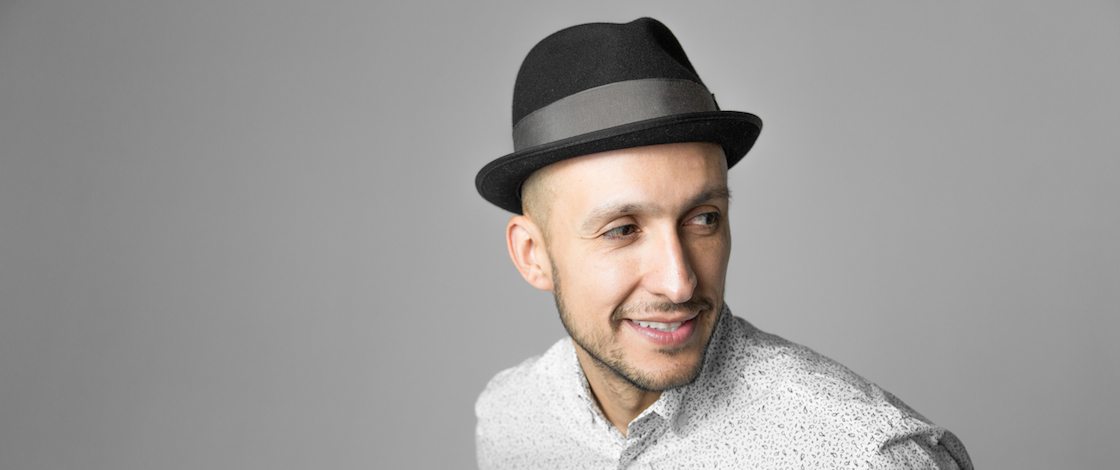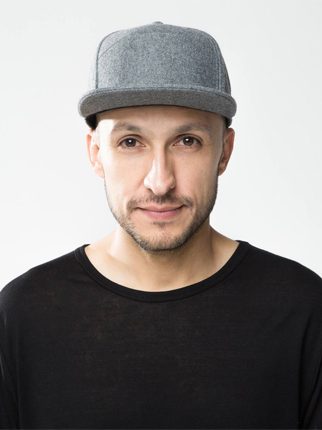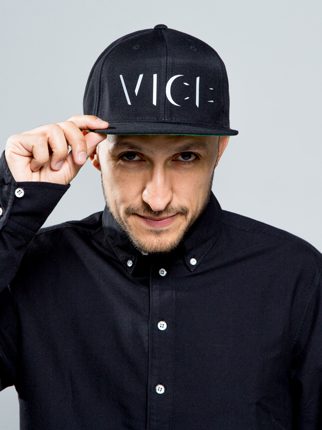Vice: The DJ’s DJ

Vice opens the doors to his multiple-studio complex just on the outskirts of East Los Angeles. His official second home, oftentimes considered his first, it’s surrounded by industrial buildings and warehouses just outside the downtown border. He’s all smiles and always down-to-earth, and we get the feeling that’s very common for him. Vice is what you’d call a “nice guy,” and you can tell his parents would be proud of his genuine kindness and manners, which are also apparent in his own son—ironically named DJ.
Vice, née Eric Aguirre, is a natural-born DJ, with the decks as his manifest destiny; he knew since middle school there was no other career choice for him outside the DJ world. A DJ’s DJ reared in the age of classic turntablism and radio DJ dominance, Vice has been active since 1992, moving from backyard gigs and family house parties to sold-out festival crowds at EDC and multiple club residencies, including Marquee (Las Vegas and New York), Encore Beach Club in Las Vegas, LIV Miami, and Create in Los Angeles.
His career spans more than two decades, a fact reflected throughout his sets, which directly mirror the diverse landscape of Los Angeles demographics, politics and ethnicities, as well as general pop culture. A Vice performance is a microcosm of modern American life and times. He’s a master of his craft as DJ, performer, and now as producer. Simply put, dude is unstoppable.
As he prepares to perform at the 19th annual Nocturnal Wonderland, Vice reflects on Los Angeles rave history, ponders the current state of EDM, drops knowledge on modern DJ culture, and schools us on the role of the DJ today.
You can’t stop these events. You can’t stop the music.
Let’s hop into the EDM time machine. Take me back to rave culture in Los Angeles in 1992 and the start of your DJ career.
I started DJing in 1992, early L.A. days where it was a big rave scene, where it was a big house party scene. In 1992 in L.A., it was a perfect year to start as a DJ because it was all about your imagination and creativity only. In 1992, it was the birth of Vice. It was the concept of music never stopping that caught me.
Today, we’re light-years away from 1992 in terms of EDM. What’s your current stance on modern EDM culture?
It’s evolved. It’s come back again from the late ‘90s and early 2000s, when I was going to raves. It was so strong in L.A., and it was so big. At the time, we didn’t have the outlets like social media gives us now. In the early 2000s, people were really hungry for it, and it grew and it grew. I feel the bubble popped out here—not because of us, but because we got bigger than the system, which is the law side of things and seeing how we can be shut down. I saw that, and I felt the whiplash of the movement growing.
Skipping from 2004 up to early 2010, when it started really coming back as a mainstream movement, I feel that this time, there was no stopping it. We’re in control of everything now. Everyone has a voice. Now I feel that us seeing dance music in the mainstream, it’s stronger than ever, but it’s also unstoppable now. You can’t stop these events; you can’t stop the music. It’s even more exciting than it was the last time it came around to the mainstream because it’s accessible everywhere and anywhere. The purists might think it in a bad way: “Oh, it’s too mainstream.” Fuck that! Let it be everywhere.
You’ve been doing this for over 20 years now. How does Vice remain relevant and continue in the game for so long?
I’m always trying to evolve, whether it’s new technology or new music. I think it’s reinventing myself over and over and staying current with trends. I stay up-to-date on music 100 percent because I live in it. I go out to events just to hear other people play. I’m a fan at the end of the day. I go to hear other DJs play sets just to inspire me. I always make my way to the middle of the dancefloor. I want to be that dude that’s in the mix with everybody.
I consider you a DJ’s DJ, a master of your craft. But you also produce original music. Are you a DJ first, then a producer?
I consider myself a DJ before a producer because it’s where I started and it’s what I know that I’m best at.
What are the challenges in switching mentalities from a DJ to a producer?
One night, I’ll be in front of 3,000 people in a club. And then the next, night you’re sitting in a room, like a cubicle, with just a monitor and two speakers and trying to figure out a track that’s going to bring that energy to the crowd. It is a challenge.
You grew up with the old-school mentality of DJ turntablism. But DJing is not the same as it was in the ‘90s. Is the art of DJing lost?
At this moment, yes, I would say so. In the purest ways, the art form is not there right now. I feel there’s more of a show before the art. I’m never going to get stuck in my old-school ways. To each their own. I honestly don’t want to judge anyone because I don’t feel that I have that power to judge anyone. If we have it in us, why not keep it alive ourselves?
I always make my way to the middle of the dancefloor. I want to be that dude that’s in the mix with everybody.
You’ve been doing this for a long time. What keeps you going?
As long as I’ve been DJing, it’s still exciting. To play Nocturnal, I’m hyped! I haven’t taken it for granted. I still feel like, in a sense, I’m still an underdog. As long as I’ve been doing it, there’s room to grow still.
I believe whatever is happening at Insomniac directly reflects EDM culture as a whole. What changes have you experienced with Insomniac events and beyond?
The amount of production now, how many eyes are on it, and the wide range of nationalities that are joining in on this music… In L.A., I used to see events were segregated. Now I feel like Insomniac has an international following at their events. When you go to EDC in Vegas, you see people coming from other countries. I didn’t see that when it was in L.A. You wouldn’t see people holding flags of other countries.
Insomniac events have always felt welcoming to people from all walks of life and from all over the world.
That’s what the dance scene is. It’s always been that. You don’t get that at any other events. You don’t get that at a hip-hop concert. You don’t get that at a rock concert. You don’t get a sense of community at all. At an Insomniac event, it always felt like home.
Vice performs at Nocturnal Wonderland Friday, September 5, at the San Manuel Amphitheater and Grounds in San Bernardino, CA. Tickets are available now.
Follow Vice on Facebook I Twitter
Stay tuned to the official Nocturnal Wonderland website and follow us on Facebook, Twitter and Instagram.





